Everyone wants to save time — and that’s where induction wins!
Cooking at home should be fast, clean, and safe — and that’s why more and more people are choosing induction cooktops. If you’re a busy woman, a bachelor, or part of a small family, this simple appliance can truly change the way you cook.
An induction cooktop is not like a regular gas stove. It uses electricity to heat the pot or pan directly — not the surface around it. This means less heat in your kitchen and more energy going straight into your food. Your meals cook quicker, and you stay cooler.
One of the best things about induction kitchen appliances is their speed. You can boil water, cook rice, or make soup in just a few minutes. They are also very clean to use — no smoke, no open flames, and fewer spills since the surface doesn’t get as hot as gas stoves.
They are also safe. If you remove the pot, the stove stops heating. This is a big help for moms with small kids or people who get busy during cooking. And unlike gas, there is no danger of leaks or fire.
Whether you are looking to cook faster at home, reduce your electricity bill, or just keep your kitchen neat, an induction cooktop is a smart pick.
Daily Induction Cooktop Tips for Maintenance
Want your cooktop to last for years? A little daily care goes a long way.
Your induction cooktop works hard every day to make cooking fast and simple. But like any other appliance, it needs love and care to keep working well. Don’t worry — it’s not hard at all. These Induction Cooktop tips are super easy to follow, even if you're not used to handling gadgets.
1. Clean After Every Use
Wipe your cooktop with a soft, wet cloth once it cools down. This removes food bits and oil that may stick. For tougher stains, use a bit of mild soap or induction-safe cleaner. Don’t use anything sharp or rough — it can scratch the surface.
2. No Heavy Scrubbing
Never use steel wool or hard scrubbers. The glass top is smooth and can get scratches. Use a soft sponge or cotton cloth.
3. Use the Right Pots and Pans
Only flat-bottom utensils work best. Make sure your pans say “induction-compatible.” If they don’t stick to a magnet, they might not work well. This helps heat transfer better and keeps the cooktop safe.
4. Don’t Slide Your Cookware
Lifting your pots instead of sliding them will keep the surface looking new. Sliding may cause marks or scratches.
5. Keep the Fans Clear
Your induction cooktop has small air vents or fans. Make sure they are not blocked by cloths, papers, or anything else. Good airflow keeps your stove from overheating.
6. No Spills in the Buttons
Try not to let water or oil drip onto the control panel. Use dry fingers when pressing buttons. This avoids short circuits and keeps your induction kitchen appliance running smoothly.
Following these small habits will keep your cooktop shiny, clean, and working perfectly for a long time. You don’t need special skills — just daily care and a little attention.
Explore Cygen’s Induction Cooktops – easy to use and easy to clean
Safety Tips You Should Never Skip
Fast cooking is great — but staying safe is even better.
Induction cooktops are much safer than gas stoves, but that doesn’t mean you should ignore safety. These Induction Cooktop tips are simple, yet they can protect you, your family, and your appliance.
Let’s go over what you must remember every day.
1. Don’t Leave It Unattended
Yes, it cooks fast. That’s why walking away “just for a minute” is not a good idea. If your food spills or burns, it can leave marks and might even damage your pot. Always stay close while it’s on.
2. Use Dry Hands
The buttons on induction kitchen appliances are sensitive. Wet fingers may cause the touch panel to act weird or stop working. Always wipe your hands before using the controls.
3. Keep Kids Away
Induction tops stay cooler than gas stoves, but pots and pans can still get very hot. Teach kids not to touch the stove while it’s on, and turn on the child lock if your model has one.
4. Let It Cool Down
After cooking, the surface might still be hot. Many cooktops show a “hot” sign — wait until it disappears before cleaning or touching. Even though there’s no flame, heat can stay on the surface.
5. Don’t Block the Vents
Every easy cooking appliance needs to breathe. Don’t place cloth, paper, or plastic near the air vents. Overheating can damage the cooktop or reduce its lifespan.
6. Check for Cracks
Even though the glass top is strong, avoid dropping anything heavy. If you see cracks or damage, stop using it and get it checked. Safety always comes first.
These safety tips are not hard to follow, and they can save you from a lot of trouble later. Whether you live alone or cook for your family, following these will make your kitchen a safer place.
Deep Cleaning Once a Week
A shiny cooktop doesn’t just look good — it works better too.
Your induction cooktop may not get as dirty as a gas stove, but grease, stains, and spills still build up over time. That’s why a simple deep cleaning once a week is a must.
Here are easy tips to keep your cooktop looking brand new.
-
This is the golden rule. Never clean the cooktop while it’s still hot. Wait until the surface cools down completely to avoid burns or damage.
-
You don’t need expensive cleaners. Just mix a few drops of dish soap in warm water. Dip a soft sponge or microfiber cloth into it. Gently wipe the surface in a circular motion. This removes oil, food bits, and fingerprints.
-
Avoid steel wool, scrub pads, or anything rough. They can scratch the glass surface. Once scratched, your cooktop will never look the same. Use only soft cloths or sponges.
-
Don’t forget the sides of your cooktop. Dirt often collects around the edges. Wrap a damp cloth around your finger and run it along the border. It’s a small step, but it makes a big difference.
-
Got a burnt spot? Make a paste with a little baking soda and water. Apply gently on the stain and let it sit for 10 minutes. Then, wipe clean. You can also spray white vinegar to shine the glass.
-
After cleaning, always wipe the surface dry with a clean cloth. Leaving water behind can cause watermarks or damage the touch panel over time.
Deep cleaning once a week takes just 5 to 10 minutes, but it keeps your easy cooking appliances working great for years. A clean cooktop also helps food cook evenly and reduces smells.
Want low-maintenance kitchen tools? Check out Cygen’s easy-to-clean induction cooktops
Utensils That Work Best on Induction Cooktops
The right utensil makes all the difference — your food cooks faster, better, and safer.
One of the most common questions people ask is:
Can I use my regular utensils on an induction cooktop?
Let’s break it down in simple words.
Only Magnetic Utensils Work
An induction cooktop uses magnetic energy to heat your pots and pans. So, your utensils must be made of iron, steel, or have a magnetic bottom. If a magnet sticks to the base, it will work.
Try this simple test at home:
Take a fridge magnet and stick it to the bottom of your pan. If it sticks, it’s perfect for induction.
Utensils That Don’t Work
-
Aluminium pans
-
Copper pots
-
Glass cookware
These don’t work unless they have a magnetic layer at the bottom.
Flat Base Works Best
For best results, use flat-bottom pans. They sit well on the surface and cook evenly. Avoid curved or uneven-bottom utensils — they may not heat properly.
Use the Right Size
Always match the pan size to the cooking zone. If your pan is too small, it may not heat at all. If it’s too big, heat won’t spread evenly.
If you’re buying new utensils, look for labels like: “Induction safe,” “Induction base,” or “Works with Induction.” These are made especially for easy cooking appliances like yours.
Using the right utensils not only protects your induction cooktop but also helps you cook faster at home with better results.
Mistakes to Avoid Making With Induction Cooktops
Want your induction cooktop to last longer and work better? Avoid these simple everyday mistakes.
Even the best appliances can get damaged if not used properly. Here are some Induction Cooktop Tips to help you avoid problems.
As we learned earlier, induction cooktops need magnetic utensils. Using the wrong ones — like aluminium or glass — won’t work and may confuse you into thinking the cooktop is faulty.
Leaving spills, oil, or food bits on the surface can lead to stains or smells over time.
Tip: Wipe the surface with a soft, damp cloth after every use.
Dragging pans across the surface can cause scratches. Always lift your pans and place them gently.
Don’t heat a pan when it’s empty. It can damage the coating and waste energy. Always place some oil or food in the pan first. Your cooktop has cooling fans that need space. Don’t place towels or other items near the air vents. It may cause overheating.
Every food needs a different heat level. Cooking everything on high heat can lead to burnt food or overcooked meals. Use the preset functions or adjust the power manually.
By avoiding these small mistakes, your cooktop will work better, stay safe, and help you cook faster at home.
Want a low-maintenance induction cooktop? Discover Cygen’s easy-to-use range today!
Are Induction Cooktops Worth It?
Thinking about upgrading your kitchen? Let’s talk honestly and simply — is an induction cooktop really a good choice for your daily cooking?
If you’re a busy woman, a working couple, or a bachelor who just wants to cook faster at home without making a mess, then yes, an induction cooktop is a smart investment. It heats up quickly, saves electricity, and is safer than open flames.
Plus, the smooth glass surface is easy to clean, even after heavy cooking. Many people love it for how simple and fast it makes their kitchen time.
Throughout this blog, we’ve shared many Induction Cooktop tips. To keep your cooktop working well, use magnetic-bottom utensils, clean the top after every use, don’t overheat empty pans, and avoid touching the hot zone after cooking.
Also, be sure to lift pots instead of dragging them to avoid scratches. These simple steps will make your cooktop last longer and work better.
So, is induction cooking good or bad? For most modern homes, it’s great. It’s one of the best easy cooking appliances you can own today. But if you often cook for a large family or make traditional foods that need open flames or deep frying, you might want to keep your gas stove too. It’s okay to use both.
At the end of the day, your cooking habits decide what’s best for you. But if you want less mess, faster meals, and a safer kitchen, induction might just be perfect for you.
Explore all cooking appliances at Cygen – find what suits your kitchen best!
 Frequently Asked Questions
Frequently Asked Questions
1. Can I use any utensil on an induction cooktop?
No, not all utensils work on induction cooktops. You need pots and pans with a flat bottom made of magnetic materials like cast iron or stainless steel. To check, simply hold a magnet to the pan’s base — if it sticks well, the pan will work. Non-magnetic cookware like aluminium or copper won’t heat properly on induction.
2. How do I clean my induction cooktop safely?
Always wait for your induction cooktop to cool down before cleaning. Use a soft cloth or sponge with warm water and a gentle cleaner. Avoid abrasive pads, steel wool, or harsh chemicals, as these can scratch the glass surface. For tough spills, gently use a plastic scraper designed for cooktops, then wipe clean with a damp cloth.
3. Is an induction cooktop safe for kids and seniors?
Yes, induction cooktops are much safer than gas stoves. The cooktop only heats the pot or pan, not the surface around it, so it stays cooler and reduces burn risks. It also cools down quickly after cooking. However, you should always supervise children and elderly family members in the kitchen to keep them safe.
4. Why does my induction cooktop make noise?
Some humming or buzzing sounds are normal when using an induction cooktop, especially on higher heat settings. This is caused by the internal coil and cooling fan working to keep the unit cool. If the noise becomes loud or unusual, make sure you’re using compatible cookware and contact customer service if the problem continues.
5. Can I leave an induction cooktop unattended while cooking?
It’s best not to leave your induction cooktop unattended. Because induction heats very quickly, food can burn or boil over fast if you step away. Always keep an eye on your cooking, and if you need to leave, turn off the cooktop to avoid accidents or wasted energy.


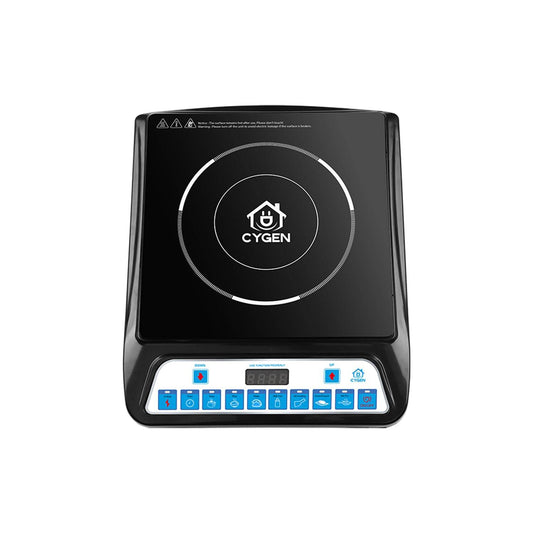
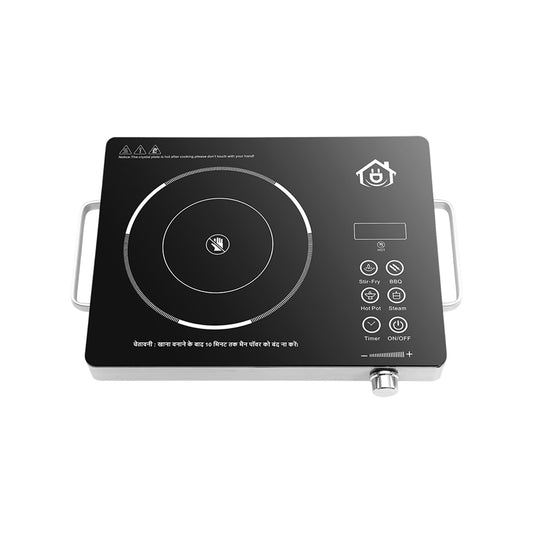
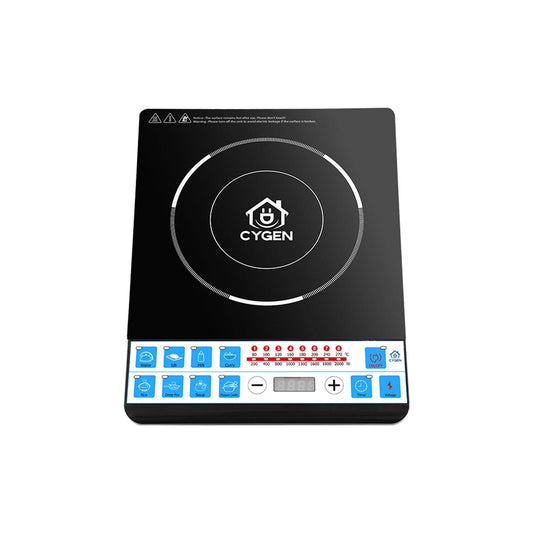
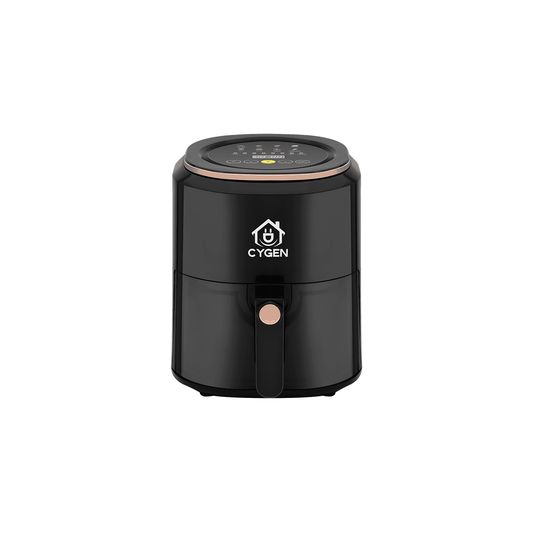
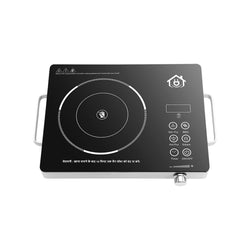
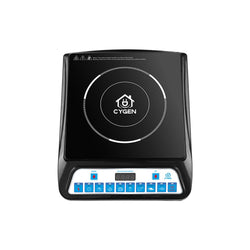
Leave a Reply
Nunc vehicula quam semper odio varius tincidunt. Vestibulum ante ipsum primis in faucibus orci luctus et ultrices posue.
Please note, comments need to be approved before they are published.